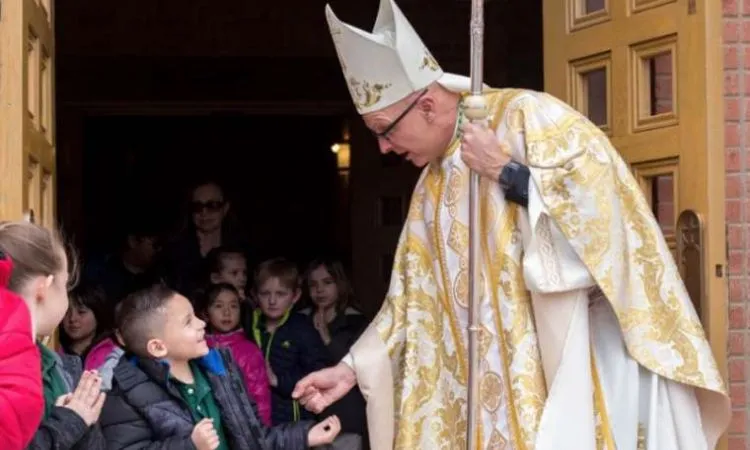
Gallup, N.M., Aug 18, 2021 / 17:19 pm (CNA).
Bishop James Wall of Gallup released a letter Wednesday reiterating that COVID-19 vaccines can be taken by Catholics “with a clear conscience,” while also asserting that the state ought not “universally mandate the vaccine without allowing for conscientious objection.”
Bishop Wall noted in the Aug. 18 letter that because of the remoteness of the material cooperation involved in taking the vaccines, and because of the benefit to the common good, “the Church has encouraged all eligible to receive the vaccines available.”
Before and as COVID-19 vaccines began to roll out, some Catholics raised concerns about the drugs’ remote connection to aborted fetal tissue. Those produced by Pfizer and Moderna were tested on cell lines likely derived from elective abortions decades ago, while the vaccine created by Johnson & Johnson was directly produced using the cell lines.
The U.S. Conference of Catholic Bishops, echoing guidance from the Vatican, has since stated that all three vaccines approved for use in the United States are “morally acceptable” for use because of their remote connection with abortion, but if one has the ability to choose a vaccine, Pfizer or Moderna’s vaccines should be chosen over Johnson & Johnson’s.
“Remote cooperation means to do something that is connected in some way to an evil but does not imply willing the evil and is not necessary to the evil itself,” Bishop Wall explained.
“The grave danger (especially for some) that COVID-19 entails certainly justifies this passive material cooperation.”
However, those whose consciences tell them not to receive the vaccine ought be given the opportunity to object to state mandates, he said. He cited a December 2020 note from the Congregation for the Doctrine of the Faith, which stated that “vaccination is not, as a rule, a moral obligation” and “therefore, it must be voluntary.”
“There are those who have reasoned and concluded that the evil of abortion is so grave that even this remote, material and passive cooperation is too much and in conscience feel that they cannot take the vaccine,” Bishop Wall wrote.
“There may be other reasons a person may conclude that they cannot in conscience receive it. The Church clearly teaches that one must always follow one’s conscience that has been sincerely reasoned and formed, even if, for no fault of their own, that conscience is erroneous.”
Unlike some bishops who have spoken on the matter, Bishop Wall did not specifically direct nor prohibit clergy from assisting Catholics in seeking religious exemptions from vaccine mandates.
The bishops of Los Angeles, San Diego and Monterey in California, as well as the Archdiocese of New York, have explicitly instructed priests not to provide religious exemption letters for those Catholics who object to the vaccine mandate, while the bishops in Colorado and South Dakota have spoken in favor of conscience rights.
Bishop Wall did, however, emphasize that anyone choosing not to be vaccinated must take steps to protect the health of others.
“If a person should decide in conscience not to take the vaccine, there is a moral requirement to take the necessary steps to protect themselves and others from contracting the virus,” he wrote.
“There may be social or economic consequences for the decision that the person must be willing to accept such as work and travel restrictions.”
Some companies have implemented mandates requiring that their employees be vaccinated as a condition of employment. In some states, the government has mandated that employees in certain sectors be vaccinated against COVID-19.
Last week, California became the first state to require all teachers, both public and private, to get the vaccine or else submit to weekly testing; New Mexico has since announced a similar policy. Healthcare workers in California will soon be required to take the vaccine as well, though that order does include a religious exemption.
And in certain cities, such as New York, there is a planned “vaccine passport” system that will limit entrance to restaurants and other locations to those who can prove they received the coronavirus vaccine.
The CDF in its December 2020 note said that the morality of vaccination depends on both the duty to pursue the common good and the duty to protect one’s own health, and that “in the absence of other means to stop or even prevent the epidemic, the common good may recommend vaccination.”
Pope Francis said in a television interview in January, “I believe that, ethically, everyone has to get the vaccine.” Pope Francis, along with six cardinals and archbishops from North, South, and Central America, recently worked with the Ad Council to produce a public service announcement promoting COVID-19 vaccines.
The National Catholic Bioethics Center, a think tank that provides guidance to uphold human dignity in health care and medical research, is opposed to mandated immunization for COVID-19, while also acknowledging that reception of the coronavirus vaccines is morally permissible.
The Catholic Health Association, the national leadership organization for Catholic health care, on July 27 strongly encouraged all health care personnel to get a COVID-19 vaccination. It voiced support for mandatory vaccination policies at hospital and health systems, “with the appropriate accommodations for medical or religious reasons.
If you value the news and views Catholic World Report provides, please consider donating to support our efforts. Your contribution will help us continue to make CWR available to all readers worldwide for free, without a subscription. Thank you for your generosity!
Click here for more information on donating to CWR. Click here to sign up for our newsletter.




Leave a Reply